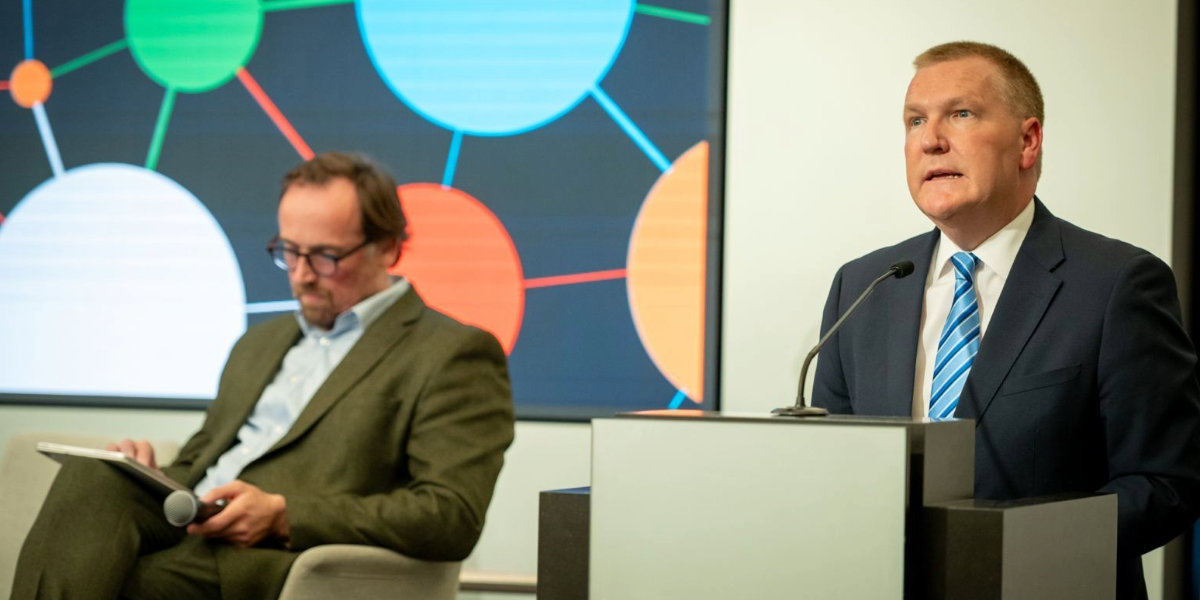Civil Society is the Democracy Shield Europe Can’t Ignore
Barbora Bukovská , Mark Dempsey / Oct 23, 2025This piece is part of the "Ideas for Europe’s Future" series by Tech Policy Press. Read more about the series here.

European Commissioner for Democracy, Justice, and the Rule of Law, Michael McGrath, delivers the keynote address at the Open Markets Institute and ARTICLE 19 conference in Brussels on October 15, 2025. Source: ARTICLE 19
Last week in Brussels, former heads of state, European Commissioners (past and present), policy makers, academics, regulators and civil society convened to confront a defining question of our era: what does sovereignty mean in a world where power over our information ecosystem is moving away from parliaments to private companies that hold our data, manipulate algorithms and control our digital infrastructure? In the age of dependency, how do we reclaim political agency and protect our democracy?
Over the two-day conference, organized by Article 19 and Open Markets Institute, there was a constant reference to the urgent need to confront Big Tech's influence over speech and the information space. There was also a strong emphasis on the need for bold and brave enforcement of existing digital rules. And a recurring focus was on how we might imagine and build better technology alternatives grounded in values and the respect of rights.
Yet one piece of the puzzle arguably hasn’t received the attention it merits. How can we build and push forward this conversation when civil society in Europe and beyond is facing an existential moment?
The promise of European values?
Although the conference was held in the capital of Europe, the United States' presence was strong, and the shadow of its politics even stronger. The US, the most powerful country in the world, once considered a guarantor of transatlantic stability, now oscillates between ally and antagonist.
In this new reality, the speakers repeatedly brought up the importance of the EU standing its ground and reaffirming its values. As former European Commission Executive Vice-President for Competition, Margrethe Vestager said, “We want to stand up to the bully and hold power to account.”
How Europe can identify future-proofed solutions and strengthen existing frameworks and tools, including the Digital Services Act and the Digital Markets Act, remains an urgent question. Alongside it, the debate around moving from dependence to independence for data, energy, technologies and infrastructure gathers pace – with pertinent questions such as how to ensure that the push for sovereignty is not solely a technical project, but a democratic one?
These questions cut to the heart of Europe’s democratic identity and the future of its civic space.
The EU’s vaunted values are tested only through the voices of its people, whether in protests against surveillance, journalism exposing corruption, or activism advancing climate and human rights.
These assertions were echoed by the European Commissioner for Democracy, Justice, and the Rule of Law, Michael McGrath, who, in his keynote speech, introduced some of the key aims and ideas behind the much-anticipated Democracy Shield initiative.
The Democracy Shield’s second pillar is aimed at ‘strengthening democratic institutions and protecting free elections and free media’. On the criticality of free media and the importance of civil society, McGrath remarked: “Democracy does not survive through institutions alone; it endures through those who speak, verify, and challenge: free citizens and civil society; free media; and the scientific community with its academic and research freedom.”
But this can only happen where Europe “recognizes civil society as a critical piece on our democracy jigsaw puzzle – not an optional accessory.” This recognition, we hope, will come in the form of an EU Civil Society Strategy currently being finalized by the EU Commission. As McGrath said: “When civil society loses space, democracy loses its oxygen.”
The civil society reality
Yet declarations of civil society’s importance meet the reality of the immense pressures its organizations face. The United States has supported European civil society groups and independent media for decades. This reliance was laid bare this year, as much of the funding that upheld freedom of expression, media freedom and digital rights effectively disappeared overnight. A report from The Review of Democracy estimated that ‘the immediate financial impact of the termination of US foreign assistance in Central Europe amounts to $30–35 million annually.’
Adding to this pressure are also attacks from within Europe. Right-wing MEPs, backed up by some members of the EU Parliament’s largest fraction, the European People’s Party (EPP), have for months engaged in misleading arguments aimed at delegitimizing the work of environmental NGOs in Brussels.
Civil society organizations seem to find themselves in a paradoxical situation, as outlined by Alberto Alemanno, academic and founder of The Good Lobby, an organization helping non-profits engage in public policy processes: “On the one hand, we keep crafting rules that ask civil society or presuppose the civil society to fill in the gaps (...) on the other hand we’ve been delegitimizing the very same NGOs, defunding them and putting them in a situation they are no longer able to provide this work.”
The time to act is now
As Alemanno pointed out, civil society is not only expected to play the traditional role of a watchdog but increasingly takes on a key role in assisting the European Commission in the enforcement of its rulebook. European lawmakers and regulators rely on civil society’s deep expertise – be it in media freedom, environment, or digital rights – at exactly the time when civil society is on its knees.
The Multiyear Financial Framework (MFF) for 2028-2034, currently under negotiation, provides an opportunity. This week,over 100 organizations have called on the European Commission to ensure the framework includes serious and strategic investment in media freedom, and support for civil society’s ability to monitor and guide the implementation and development of legal safeguards that keep the media, and by extension democracy, alive.
Can McGrath’s touted Civil Society Strategy deliver something meaningful? Let’s see.
Authors

